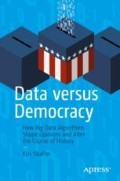Abstract
This chapter will explain the shift from an information economy to an attention economy and lay out the implications for how information is created, shared, and consumed on the internet. Having transitioned from a time of information scarcity to information abundance, information is no longer a sufficiently monetizable commodity to drive an economy. The focus of human attention as the monetizable commodity in limited supply gives content recommendation algorithms a pivotal place in our information landscape and our economy. This chapter lays out the general economic, cognitive, and technological backdrop for the emergence of those algorithms.
Access this chapter
Tax calculation will be finalised at checkout
Purchases are for personal use only
Notes
- 1.
Steven Pinker, How the Mind Works, New York: W. W. Norton & Company, Inc. (1997), pp. 524–25.
- 2.
For a detailed discussion, see Jerome H. Barkow, Leda Cosmides, and John Tooby (eds), The Adapted Mind: Evolutionary Psychology and the Generation of Culture, New York, NY: Oxford University Press (1992).
- 3.
Most of the basic human cognitive functions are shared with other animal species, especially other mammals, and thus were likely possessed by our shared ancestors millions of years ago. But even some of humanity’s more advanced cognitive capacities are shared with other primates, as discussed in fascinating detail in Douglas Fox, “How Human Smarts Evolved,” Sapiens, published July 27, 2018, www.sapiens.org/evolution/primate-intelligence/ .
- 4.
While scientists are still researching and debating when exactly humans developed the cognitive functions we know and rely on today, there is strong evidence that Homo sapiens possessed the high-level cognitive skills of spoken language and even music at least 50,000 years ago. See Steven Mithen, The Singing Neanderthals: The Origins of Music, Language, Mind and Body, London: The Orion Publishing Group, Ltd. (2005), pp. 260–65.
- 5.
Michael H. Goldhaber, “The Attention Economy and the Net,” First Monday 2/4, published April 7, 1997, http://journals.uic.edu/ojs/index.php/fm/article/view/519/440 .
- 6.
Paul Mason, Postcapitalism: A Guide to Our Future, New York: Farrar, Straus and Giroux (2015).
- 7.
Gordon E. Moore, “Progress in Digital Integrated Electronics,” Intel Corporation (1975), p. 3.
- 8.
Cited in Doctorow, Information Doesn’t Want to Be Free: Laws for the Internet Age, p. 94.
- 9.
Ibid.
- 10.
Goldhaber, “The Attention Economy and the Net.”
- 11.
“Introduction, Attention as a Cultural Problem,” The World Beyond Your Head: On Becoming an Individual in an Age of Distraction (hardcover) (1st ed.), Farrar, Straus and Giroux, p. 11.
- 12.
For more on Cambridge Analytica in particular, see the groundbreaking journalism of The Guardian in “The Cambridge Analytica Files,” www.theguardian.com/news/series/cambridge-analytica-files .
- 13.
Paul Lewis, “’Our Minds Can Be Hijacked’: The Tech Insiders who Fear a Smartphone Dystopia,” The Guardian, published October 6, 2017, www.theguardian.com/technology/2017/oct/05/smartphone-addiction-silicon-valley-dystopia .
- 14.
Greg McFarlane, “How Facebook, Twitter, Social Media Make Money From You,” Investopedia, last updated March 21, 2014, www.investopedia.com/articles/investing/022315/high-cost-advertising-times-square.asp . See also, “How much It costs to advertise on Facebook,” Facebook Business, accessed February 6, 2019, www.facebook.com/business/help/201828586525529 .
- 15.
Mike Allen, “Sean Parker unloads on Facebook: ‘God only knows what it’s doing to our children’s brains’,” Axios, published November 9, 2017, www.axios.com/sean-parker-unloads-on-facebook-god-only-knows-what-its-doing-to-our-childrens-brains-1513306792-f855e7b4-4e99-4d60-8d51-2775559c2671.html .
- 16.
Ibid.
- 17.
Cory Doctorow, Information Doesn’t Want to be Free: Laws for the Internet Age, San Francisco: McSweeney’s (2014), p. 55ff. See also Paul Mason, Postcapitalism: A Guide to Our future, New York: Farrar, Straus and Giroux (2015), p. 119.
- 18.
Kashmir Hill, “How Target Figured Out a Teen Girl Was Pregnant Before Her Father Did,” Forbes, published February 16, 2012, www.forbes.com/sites/kashmirhill/2012/02/16/how-target-figured-out-a-teen-girl-was-pregnant-before-her-father-did/ .
- 19.
Linda Stone, “Beyond Simple Multi-Tasking: Continuous Partial Attention,” Linda Stone (blog), November 30, 2009, https://lindastone.net/2009/11/30/beyond-simple-multi-tasking-continuous-partial-attention/ .
- 20.
Howard Rheingold, Net Smart: How to Thrive Online, Cambridge, Mass.: MIT Press (2014), p. 39.
- 21.
Jacques Ellul, Propaganda: The Formation of Men’s Attitudes, New York, Vintage Books (1965), p. 61.
- 22.
Cited in Jacques Ellul, Propaganda: The Formation of Men’s Attitudes, p. x.
- 23.
Clay Shirky, “Why Abundance Is Good: A Reply to Nick Carr,” Encyclopaedia Britannica Blog, July 17, 2008, http://blogs.britannica.com/2008/07/why-abundance-is-good-a-reply-to-nick-carr/ .
- 24.
Net Smart, p. 50.
Author information
Authors and Affiliations
Rights and permissions
Copyright information
© 2019 Kris Shaffer
About this chapter
Cite this chapter
Shaffer, K. (2019). Pay Attention. In: Data versus Democracy. Apress, Berkeley, CA. https://doi.org/10.1007/978-1-4842-4540-8_1
Download citation
DOI: https://doi.org/10.1007/978-1-4842-4540-8_1
Published:
Publisher Name: Apress, Berkeley, CA
Print ISBN: 978-1-4842-4539-2
Online ISBN: 978-1-4842-4540-8
eBook Packages: Professional and Applied ComputingApress Access BooksProfessional and Applied Computing (R0)

